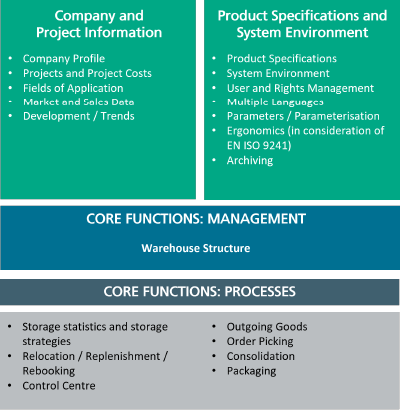Pick-by Questionnaire (in planning)
Which Functional Aspects Does the Pick-by Questionnaire Cover?

The questionnaires for Pick-by Systems (Pick-by questionnaire) are part of the System questionnaires, which together form the basis of the »Logistics IT Database« provided by Fraunhofer IML.
In addition to general aspects about the company, the questionnaires also cover the company’s range of services and experiences in the area of Pick-by. However, the focus of the Pick-by questionnaires is on the functional support of the picking processes. Here, not only the intuitive guidance through the picking process is recorded, but also the possible influence the employees themselves can take on the workflow. Furthermore, special features are recorded depending on the respective solution.
This results in a level of detail that reflects both the individual requirements of the user and the functional capabilities of the Pick-by solutions. Typical questions are for example
- How many employees can work with this Pick-by system simultaneously?
- How does the selection of a job on the device take place?
- Is it possible that several people work on the same picking order?
Scope of functions of the Pick-by Questionnaire
In addition, the questionnaire collects a variety of other information relating to developments, trends and assessments of the respective company in the Pick-by market.
The questionnaire is adapted or extended annually according to the latest requirements and developments. In addition to project experience, feedback from the users of the database (Pick-by providers, Pick-by users and consulting companies) is also used for this purpose.
Validation and Use of the Data
The data provided by a Logistics IT provider is not added to the Database or made available for use by »Logistics IT Online Selection« until it has been successfully validated. The annual updating of the questionnaire combined with the yearly validation of the data is what guarantees that the data is always up to date.
